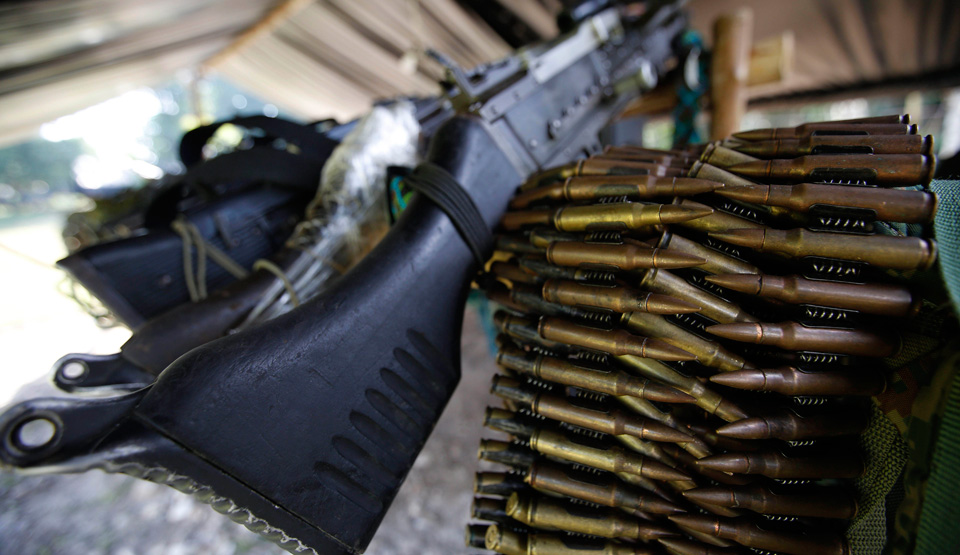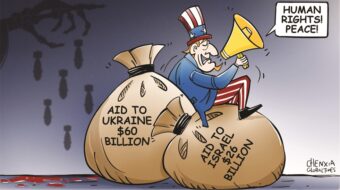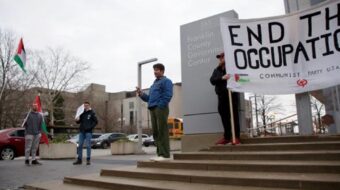
Most Colombians favor the peace agreement signed November 24, 2016 between their government and the Revolutionary Armed Forces of Colombia (FARC-EP). War lasting 53 years had ended. But transition to an equitable, peaceful society for all Colombians is far from certain. The government has been slow to implement provisions of the agreement, and paramilitaries are attacking left-leaning political activists and members of social movements.
A failed peace agreement would be a blow against those Colombians who, rejecting armed struggle, fought for the agrarian and/or economic rights of Colombia’s majority population and did so despite severe repression. Progressive forces worldwide have paid attention, the more so because the U.S. government is allied with the upper echelons of Colombian society who control land and the economy.
Recently, members of the European Parliament heard testimony from Colombian leftists who support the agreement. Separately, a delegation sent by the European Commission gained a first-hand look at realities in Colombia.
On March 28, nine Colombians spoke before a meeting in Brussels called by the “Confederal Group of the European United Left/Nordic Green Left,” which exists as a bloc within the European Parliament. Colombian journalist Pedro Nolasco Présiga, based in Belgium, summarized their presentations. Quotations appearing in the excerpts below are from his summary.
Imelda Daza was a founding member of the much-persecuted Patriotic Union. Now representing Voices for Peace, she monitors the Colombian Congress’ implementation of the peace agreement. In her remarks, she emphasized the “continual verbal aggressions, pressures, deceptions, and lies of the Democratic Center, [the party headed by former president Álvaro Uribe, now a senator,] against the agreement.”
Communist Party member Carlos Eduardo Loza, president of the United Worker’s Union (USO), accused multinational corporations of “seeing peace as an instrument and means for actions taken to expand mining and energy extraction, which entails more plundering of the country’s natural wealth.” He called for agrarian reforms, counter-measures against paramilitaries, political participation for all, and no more “privatization and selling-off of state assets and enterprises.”
Andrés Gil, national spokesperson for the Patriot March coalition, suggested that improved U.S. relations with Cuba have created “a political climate favorable for negotiations and reconciliation,” and said they are a model for conflict resolution throughout the region. He warned against “the new North American administration…becoming a threat to the peace process in Colombia.”
Spanish lawyer Enrique Santiago, who advises the FARC-EP, helped fashion the Special Jurisdiction for Peace (JEP) that, as part of the peace agreement, would decide whether former combatants were to be punished or amnestied. Santiago reported that the “Attorney General has intruded and blocked the functioning, application, follow-up, implementation, and completion of the JEP.” He claimed that congressional modifications of the original agreement have interfered with implementation. He too criticized the government for its tepid response to paramilitary violence.
On March 31, members of a European Commission on Verification of Human Rights summarized conclusions they reached after a visit to Colombia that began on March 16. According to their report (available here), “[O]fficers of institutions and representatives of social organizations of Germany, Belgium, Italy, and Spain” – 40 in all – met with “30 groups including state, church, and institutional organizations, and human rights organizations, unions, social movements, and women’s groups.”
The reports notes that, “The peace agreement…supposes the beginning of a new reality of hope for Colombia,” but that hope is now “truncated by the lack of governmental will for carrying out what was agreed upon, and by the growing activity of paramilitary groups… [We] think it is impossible for the agreed-upon actions to be accomplished within the [required] 180-day period after the agreement’s signing. The FARC is not yet giving up arms for good, nor converting itself into a political party, nor starting to incorporate itself into civilian life.”
The observers noted that only four legislative measures of the 40 that were to have been enacted are in force, that United Nations personnel charged with monitoring the handover of arms aren’t functioning, and that living conditions and security arrangements for guerrillas in their new locations are abysmal.
The Europeans reported that paramilitaries are seriously threatening “social leaders and the survival of their very communities,” and that “assassinations of social leaders and defenders of human rights” are increasing. They recalled governmental inaction during “the extermination of the Patriotic Union” from the mid-1980s onward, when “5,000 members of this party were assassinated.”
The European delegation also blamed flawed implementation of the agreement on an “anachronistic and extreme right wing determined to derail the process.”
Political writer William Ospina, writing in 2013, observed that, “The old Colombia died on April 9, 1948, and the new one still has not been born.” On that day 69 years ago, an assassin killed Liberal Party leader Jorge Eliécer Gaitán. He had inspired a great mobilization of the dispossessed and marginalized that took on Colombia’s long-entrenched oligarchy.
Violence exploded after Gaitán’s murder, and hasn’t stopped since. From 1964 on, it took place mostly within the context of civil war involving the FARC-EP. That war may be over, but the wait for a new Colombia continues.












Comments